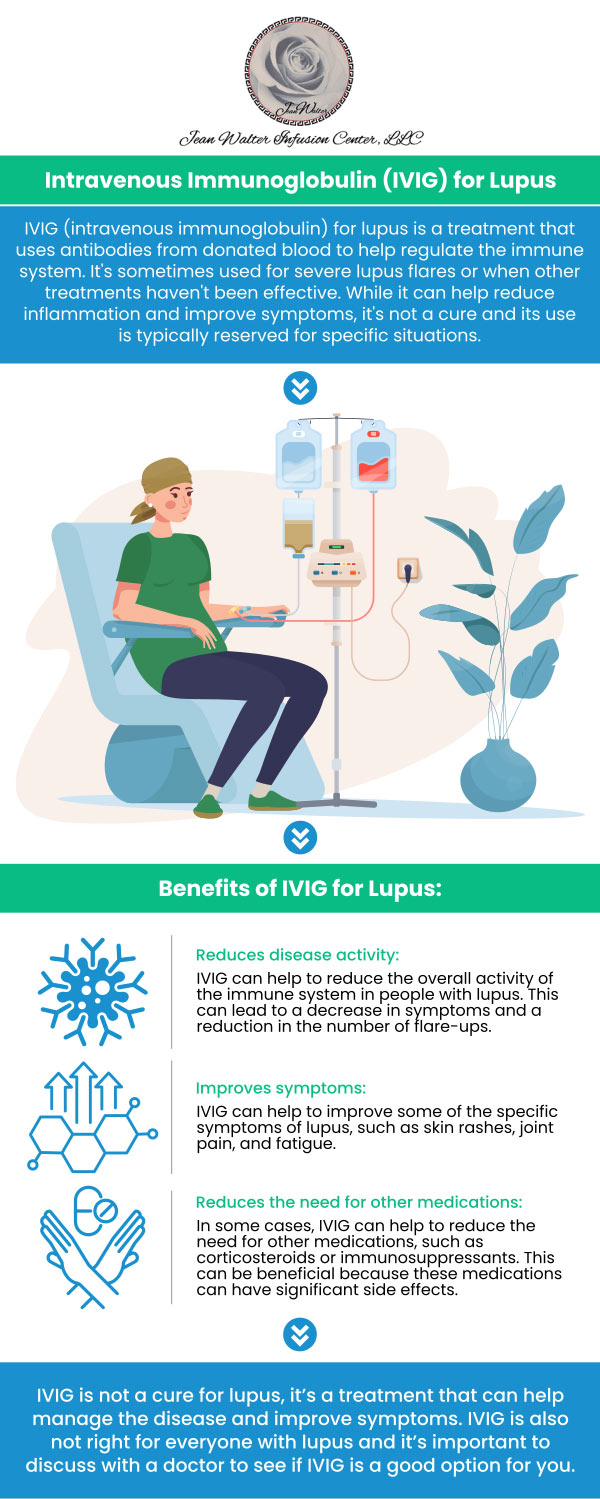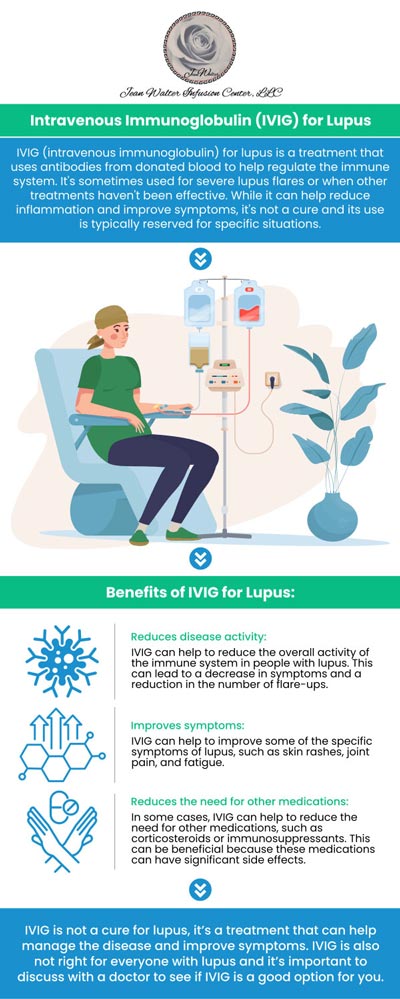Infusion Therapy for Lupus Q&A
Lupus is an inflammatory disease that occurs when the immune system assaults the body’s own tissues. Lupus (SLE) can cause problems with the joints, skin, kidneys, blood cells, brain, heart, and lungs. Symptoms might range from weariness to joint discomfort, rash, and fever. They can worsen (flare-ups) and then improve on a regular basis. IV therapy for Lupus can boost the immune system, alleviating Lupus symptoms. Dr. Nasser Nasseri, MD offers Infusion therapy for lupus at Jean Walter Infusion. Book your next appointment with our experienced professionals and let us help keep your health in check! For more information, contact us or book an appointment online. We have convenient locations to serve you in Edgewater, Rosedale, Columbia, Glen Burnie, North Baltimore, and Catonsville MD.




Table of Contents:
What is infusion therapy for lupus?
How does infusion therapy work in the treatment of lupus?
How effective is infusion therapy at treating lupus symptoms?
What are the potential benefits of infusion therapy for lupus?
The body is designed to fight infections and repair damaged tissues. It is possible for the body’s immune system to become overactive and attack normal, healthy tissue. The condition is referred to as an autoimmune disease. Lupus is one form of autoimmune disease individuals may contract.
Lupus is a rare, but life-threatening disease that primarily affects women. A skin rash or swelling can occur, leading to infection and other complications. There are creams and oral medications that can be used to treat Lupus, but they are not always effective. A solution to this problem is infusion therapy.
IV medications are administered to patients who can’t be treated orally. Medications are administered via an infusion pump into a vein through a catheter. With treatments lasting anywhere from 25 minutes to several hours, infusion therapy is a fast and efficient way to distribute medicine.
The disease is treated with a biological medication, as with most autoimmune diseases. If you have lupus, talk to your doctor or an infusion physician about the risks and side effects of various medications. It is also important to consider your medical history when choosing the lupus medication that is right for you. Dr. Bilal Hasan, MD, at our clinic, makes sure to provide you with immediate care with expertise.
Those who can’t tolerate oral medication can have IV infusions for lupus to deliver medication intravenously. An infusion pump sends medication into the body through a catheter during infusion therapy. According to the level of treatment required, IV infusions for lupus can take as little as 25 minutes or as long as several hours.
As patients receive their infusions, they are encouraged to relax, unwind, and enjoy themselves. The attentive Jean Walter Infusion staff are on hand if a patient need arises. It is important to note that IV infusions can have side effects in individuals with lupus.
To reduce the potential for an adverse event, the patient may need to be switched to a different lupus IV treatment medication. Among the most common side effects of an IV infusion for lupus are infections, liver problems, ulcers around the mouth, and allergic reactions within 24 hours. The referring physician should be consulted before making any changes to a patient’s prescribed treatment regimen.
Lupus is a chronic condition with no known cure however, treatments can help to manage and alleviate symptoms. Infusion therapy offers a highly effective opportunity for patients to manage their lupus symptoms and help them to live with their condition.
An IV infusion for lupus involves injecting vitamins, minerals, and other natural substances directly into the bloodstream. This bypasses the digestive system and allows nutrients to reach the organs directly. By ingesting vitamins or other substances orally, many substances are rendered inactive in the digestive tract and have a reduced potency.
The immune system receives a boost when nutrients are directly injected into the body, and deficiencies are corrected. The increased blood levels can also correct deficiencies caused by the disease by providing an immediate therapeutic response.
Direct delivery of the substances to the body’s organs results in an immediate therapeutic response. Because Lupus directly affects the immune system, IV therapy for Lupus can boost the immune system, alleviating Lupus symptoms. Lupus can be managed with a variety of vitamin infusions.
Various vitamin infusion treatments are available for lupus, and they can be used together or separately. All of them aim to strengthen the immune system, which is the most important component of lupus that needs to be addressed. As the immune system becomes stronger, symptoms can diminish, and quality of life can improve. Our team of professionals helps in recovery and guides you through the services we provide for a better understanding.
Lupus infusion therapy for lupus is available at Jean Walter Infusion Center. For more information, contact us or request an appointment online. We serve patients from Rosedale MD, Columbia MD, Glen Burnie MD, Catonsville MD, North Baltimore MD, Edgewater MD, Parkville MD, Middle River MD, Dundalk MD, Halethrope MD, Ellicott City MD, Laurel MD, Hebbville MD, and Woodlawn MD.
Check Out Our 5 Star Reviews

Additional Services We Offer


- Infusion Therapy
- Injection Treatments
- Intravenous Immunoglobulin Therapy
- Medical Conditions
- Asthma
- Crohn’s Disease
- Fibromyalgia
- Gout
- Inflammatory Eye Disease
- Inflammatory Skin Disease
- Iron Deficiency
- Lupus
- Multiple Sclerosis
- Myositis
- Osteoporosis
- Rheumatoid Arthritis
- Ulcerative Colitis
- Vasculitis
- PRP Injections






